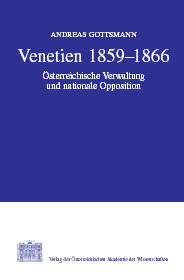
Venetien 1859-1866. Österreichische Verwaltung und nationale Opposition, pp. 593-602, 2005/03/15

In den Monaten nach dem verlorenen Krieg von 1859 sah sich Kaiser Franz Joseph gezwungen, den Forderungen der ökonomischen Eliten nach politischer Partizipation im Zentrum des Reiches und in den Ländern zumindest teilweise nachzukommen. Die neue Führungsschicht strebte einen konstitutionellen Rahmen an, in dem die wichtigsten liberalen Grundwerte verwirklicht werden sollten und das Staatsganze auf eine neue Grundlage gestellt wurde. Die Gründung des Königreichs Italien im Frühjahr 1861 und die stärker werdende italienische Nationalbewegung waren große politische Herausforderungen an das multiethnisch und mulitkulturell geprägte Habsburgerreich. Während man zunächst mit polizeistaatlichen Methoden reagierte, entschloss man sich ab 1861 dazu, die vom Reichsrat in Wien verabschiedeten und vom liberalen Denken geprägten Gesetze größtenteils auch in Venetien in Kraft zu setzen und auch im Kampf gegen die staatliche Opposition rechtsstaatliche Kriterien zu beachten. In den Schwerpunkten Bürokratie, Landesvertretung und Landesstatut, Kirche, Bildung und Kultur, politische Opposition, Emigration, Wirtschaft sowie Gesetzgebung wird ein Bild des italienischen Kronlandes in den Jahren vor seiner Abtretung gegeben. Es zeigt sich, dass die von der Regierung angestrebte und immer wieder proklamierte Integration Venetiens in das politische System der Habsburgermonarchie letztlich nicht gelang. Nichtsdestotrotz prägte die österreichische Verwaltung in den sechs Jahrzehnten der Zugehörigkeit Venetiens zur Habsburgermonarchie die Geschichte und Kultur des Landes nachhaltig.
…
In the months following the lost war of 1859, Emperor Franz Joseph found himself forced, at least in part, to concede to the demand of the economical elite to participate politically in the inner circles of the Empire and in the various states. The new ruling class strove for a constitutional framework in which the most important liberal basic values could be actualized and the State as a whole could be set on a new foundation. The founding of the Kingdom of Italy in the spring of 1861 and the rising Italian nationalist movement were a significant political challenge for the multiethnic and multicultural Habsburg Empire.
Although police state methods were initially used to govern, it was decided in 1861 to put most of the liberal laws, which had been discarded by the government in Vienna, into force in Venice, and also to observe constitutional criteria in the fight against state opposition. Based on this background, it is attempted to portray the events and developments in the years from 1859 to 1866. A picture of the Italian provinces in the years before their relinquishment, with emphasis on bureaucracy, state representation and statutes, the church, education and culture, political opposition, emigration, economy and legislation, is presented. It will be shown that the government’s attempts, which were repeatedly proclaimed, to integrate Venice into the political system of the Hapsburg monarchy finally failed.